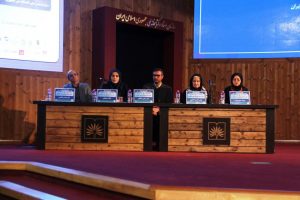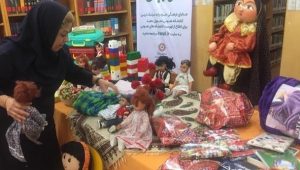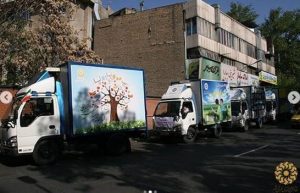Recreation & Leisure time in Public Libraries: The Report of an Interdisciplinary Discussion.
The Fifth National Congress of Iranian Information Science Specialists was held on November 20 and 21, 2019. The congress included more than 20 specialized panels on a variety of topics, each dealing with a range of professional librarianship and information issues. One of the permanent panels of this congress is the Public Libraries Panel, which was chaired by Fatemeh Pazooki (Head of the Standard Office of the Iran Public Libraries Foundation and a member of the IFLA Public Libraries Committee) who was accompanied by other specialists.
“We opened up this issue in spite of the challenges we encountered on a variety of issues because we had a matrix and mental framework for public libraries’ functions and duties, which were generally raised by upstream documents including the IFLA / UNESCO manifesto. Accordingly, public libraries have three main functions: Information, Education, and Recreation. The duty of Information has so far received much attention and debate, perhaps more than any other discipline in our field, in that we find ourselves famous for it and responsible to work more in this discipline. Education is the next, which has been debated and was a keynote presentation of last year’s theme of congress and has more obvious lines and policies than the Information and Recreation. However, Recreation and Leisure is a debate that seems to be largely ignored, and perhaps it can be said that it is not properly understood at all. It should be borne in mind that discussing leisure does not solely include people’s free time or recreation. Indeed, when it comes to two other functions, it conveys a concept that encompasses many of the tasks that the public library should carry out. ”
Dr. Kazemi (Faculty Member of the Research Institute for Cultural and Social Sciences) delivered his speech on the dimensions of public space and Public sphere concepts, where he pointed the differences between library public space and library Public sphere. 1. Public Sphere 2. Public space. Public sphere is the place where individuals assemble to discuss their private or public issues. After that, he continued with a question: why do people go to parks instead of going to a public library? He said in response, “As stated, in the category of unproductive use of time or the dramatic use of time and the display of comfort, and the productive use of time for psychic or physiological discharge, as I pointed out, if humans fall into each of the spectrums (dominant or subordinate), neither of those two types of time consumption is completely shut down. It means that for a person with a purely functional entity, the dramatic use of time is not shut down completely, and unproductive use of time is not eliminated, but by imitating the dominant class, he wants to show the comfort on its own, or through his wife and children, that is why it would be minimalized (leisure).
Following that Dr. Shaghaghi (Shahid Beheshti University) was invited to talk about the concept of Leisure and Leisure time and the related institutions, as well as the distinction between these two issues; in fact, it was an introduction into the concept of leisure time versus the concept of work. He explained: “In this meeting, I would like to discuss the concept of leisure. Why do people go to parks instead of going to a public library? He said in response, “As stated, in the category of unproductive use of time or the dramatic use of time and the display of comfort, and the productive use of time for psychic or physiological discharge, as I pointed out, if humans fall into each of the spectrums (dominant or subordinate), neither of those two types of time consumption is completely shut down.
The second point about our entry into the discussion of public libraries is from a leisure angle that, as pointed out, the consumption of leisure means using time to recreate the physical or mental strength to prepare for restarting your work. Thus, all information activities that have an educational or informational aspect do not include the concept of using leisure time to recreate yourself for restarting the work, but a kind of preparation for a compulsory task, such as learning something, making a slide, learning a PowerPoint or reading a discussion in a book for a presentation, which are just a background to do a compulsory task and therefore that is a part of the task not a recreation of your intellectual or physical forces.”
Ms. Khorasanchi also enhanced in her presentation the meaning of leasure time and public libraries. “I think when it comes to leisure time in public libraries; the issue should be looked at through two perspectives: 1. audiences, 2. librarians. The usual discussion that what must a public library do? In this discussion, librarians are unconsciously considered. While the key role and the main difference between one public library and another is precisely the librarians who work there. Forget about this fact that how much authority and equipment they are given, which is something that all of us know about it. Just I would like to state that UNESCO has adopted “Open Science” as the motto of the World Science Day for Peace and Development in which the first and foremost issue is the free access to information. How much free access to information can play a role in persuading a person to come to a public library to have leisure and feel comfortable in every way and access to information? She continued by referring to the platform thinking approach and added, “The most fundamental debate in the field of platform thinking is the survival of libraries in the fourth industrial revolution, which is about to reach the fifth one. If public libraries want to preserve their functions and physical entity as much as their virtual entity, I think we should have a pack for our audience with regard to the debate of leisure time. It means that we should not consider our audience individually and alone, but families and friends together. That is, we should have some space in a public library for a group of teenagers. These are the actual experiences. When I was in charge of the Hosseinieh-Ershad Public Library, teenagers came to the library after school (and with their families on holidays) to spend their leisure time, which can be reminded as practical experiences.”
Text by: Fatemeh Pazooki, PhD Candidate of LIS, Alzahra University, Tehran, Iran.



